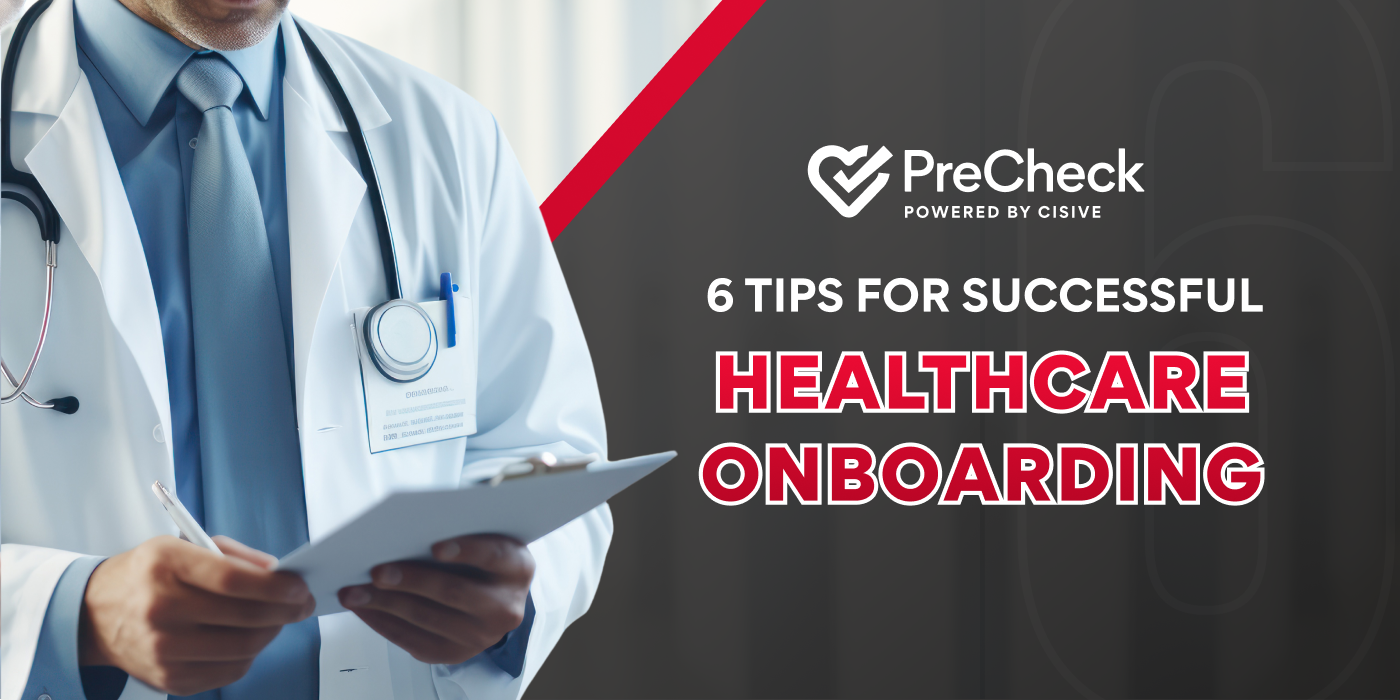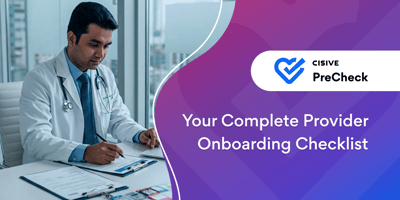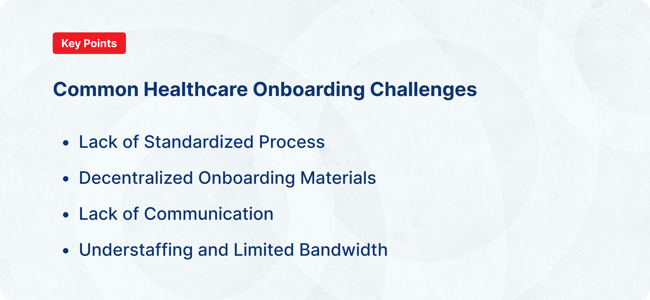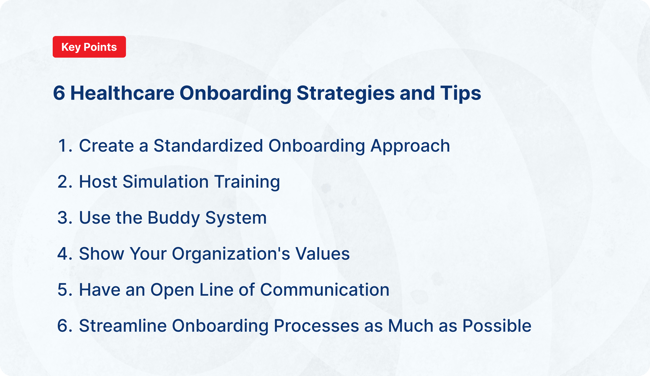

Bringing a new provider into your healthcare organization is the beginning of a critical...

Healthcare organizations face many challenges, such as staff shortages and an increased demand for healthcare services associated with a rapidly aging population. One way to address these challenges is to hire high-quality healthcare workers to provide patient care. Here's what you need to know about healthcare onboarding and its importance:
Healthcare onboarding is one of the most important steps in the hiring process. It gives new hires information about your company, introduces them to your culture, and sets the tone for their first few weeks of employment.
Despite the importance of onboarding, many companies skimp on certain aspects of the process due to time and cost constraints. Find out how to overcome some of the most common onboarding challenges for the success of your organization.
Key Takeaways
|
Table of Contents
Healthcare onboarding is the process of integrating a new employee into your organization. Done right, onboarding helps new hires adjust to your culture, reduces the stress of starting a new job, and may help you improve your organization's retention rate.
Whether you're doing nurse onboarding or doctor onboarding, the process varies a little from one organization to the next. Some companies offer a short introduction to the organization, introduce new hires to key staff members, and start on-the-job training almost immediately.
Others have a lengthy onboarding process that takes several weeks or even months. New hires may have to learn new software programs, participate in role-playing activities, complete job-related certifications, or complete classroom training before they start learning how to perform their job duties.
Generally, the new hire's supervisor is responsible for overseeing the onboarding process. However, some organizations leave onboarding to their HR teams.
Recommended Reading: Best Nurse Background Check Services
Here are some examples of why healthcare onboarding is so important for the success of your organization:
Recommended Reading: How You Can Solve the Nursing Shortage

Although onboarding is important, it certainly isn't easy. If you've ever participated in the onboarding process, perhaps you've encountered some of these challenges.
Some organizations don't pay as much attention to onboarding as they should, resulting in a lack of standardization. If you're not following a standardized process, new hires may not get the information they need to succeed in their jobs.
For example, one manager may spend several hours getting a new hire up to speed while the other manager spends 15 minutes telling the new hire when to take lunch and how to submit a time sheet. The first employee is likely to feel much more prepared to tackle their new role.
To give new hires the greatest chance of success, your onboarding materials should be in a central location. If new employees can't find what they need, they may not be able to get up and running as quickly as expected.
For example, if you have some information in a binder, some in a computer database, and some in your HR office, new hires have to go to three different places to get answers to their questions. This can be discouraging, and it takes time away from more important activities.
New hires shouldn't have to guess where they need to be or what they need to do. However, it's a challenge for some organizations to communicate effectively with their new employees.
For example, if a hiring supervisor fails to share important information about a new employee's job duties, the employee may feel ignored. The lack of communication may also put employees or patients at risk.
Understaffing is a major problem for healthcare organizations in the United States. Many facilities struggle to hire and keep enough nurses, physicians, midlevel providers, and healthcare support staff.
If you're dealing with a staff shortage, your employees may have way too much on their plates to add onboarding to their duties. As a result, new hires may not get the full onboarding experience, leaving them feeling uncertain about their ability to succeed.
Recommended Reading: Your Must-Have Guide to Healthcare Background Check Compliance

The good news is that you don't have to let these challenges derail your onboarding efforts. Use these strategies and tips to improve your onboarding program to everyone's benefit.
Before you do anything else, take time to create a standardized onboarding approach. You may deliver different types of content to new hires in different departments, but they should all move through the onboarding process in a systematic way.
Using a standardized process ensures that new employees understand your mission and know where to go for help if they need it. Standardizing your onboarding program also makes it easier for hiring managers to integrate new employees into their departments.
Healthcare simulations allow new hires to practice their skills before working with real patients. If you're not already using simulation as part of your onboarding program, now is a good time to start.
When new hires practice their skills, they have the opportunity to build their confidence. Simulation also benefits patients, as it helps new hires learn how to avoid common mistakes, which may increase patient comfort and enhance safety.
A buddy is an experienced employee who already understands the ins and outs of your organization. When you pair a new hire with a buddy, the new hire has more opportunities to ask questions and observe an experienced healthcare professional in action.
Using the buddy system has the potential to increase retention, as it gives new hires much-needed support as they complete their first few months of employment.
One way to make healthcare onboarding more effective is to make sure that your onboarding process mirrors your organization's values. If it doesn't, employees are likely to notice the difference between what you say and what you do, making them question their role in your organization.
For example, if one of your organization's values is honesty, you need to be honest about each aspect of the onboarding process. If you sugarcoat things, new hires are likely to feel discouraged when they discover the discrepancy.
New hires need regular feedback to build their confidence and help them learn new skills. Therefore, keeping the lines of communication is essential for retaining high-quality employees and showing that you care about their success.
During the onboarding process, make sure you have someone available to answer questions and provide support when needed. It's also helpful to create a training binder or an internal database with answers to frequently asked questions.
A streamlined onboarding process helps new hires avoid confusion. It also makes it easier for hiring supervisors to complete onboarding tasks when they're busy.
To streamline your current process, look for redundant activities or tasks you can automate. Be sure to seek input from hiring supervisors and current employees before making process updates.
It's also helpful to partner with an experienced employee screening company to handle background checks, drug testing, and occupational health services. PreCheck by Cisive has extensive experience helping healthcare organizations comply with background screening requirements.
Healthcare onboarding is one of the most important steps in the hiring process, as it helps you set the tone for an employee's entire course of employment. If you're not using a standardized process, consider eliminating redundant activities and asking your hiring supervisors for input.
When you're ready to roll out your new program, partner with an experienced employee screening company to ensure you find the right people for your organization.
PreCheck offers a full suite of solutions for employers in the healthcare industry, such as background checks, license monitoring, exclusion screening, and more. Speak with an expert to find out how we can help you increase the quality of your workforce with a successful healthcare onboarding program.
Author: Cisive Staff
Bio: Contributed by a member of our staff with expertise in background screening for highly regulated industries.
Let's Connect on LinkedIn